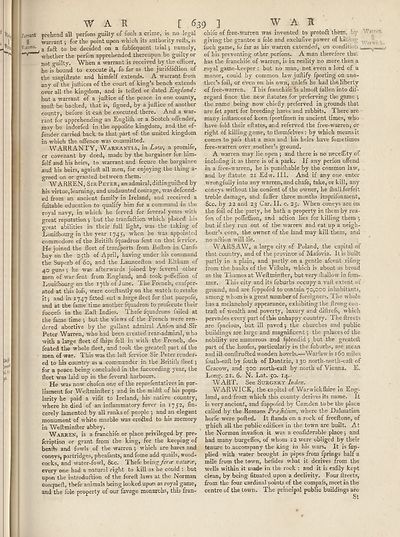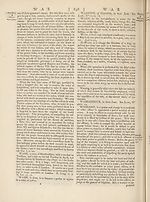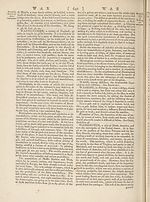Encyclopaedia Britannica, or, a Dictionary of arts, sciences, and miscellaneous literature : enlarged and improved. Illustrated with nearly six hundred engravings > Volume 20, SUI-ZYM
(759) Page 639
Download files
Complete book:
Individual page:
Thumbnail gallery: Grid view | List view

WAR
[ ^39 ]
W A 1
prehend all perfons guilty of fuch a crime, is no legal
warrant ; for the point upon which its authority refts, is
a fa& to be decided on a fubfequent trial; namely,
whether the perfon apprehended thereupon be guilty or
not guilty. When a warrant is received by the officer,
he is bound to execute it, fo far as the jurifdi&ion of
the magiftrate and himfelf extends. A warrant from
any of the juftices of the court of king’s bench extends
overall the kingdom, and is tefted or dated England:
but a warrant of a juftice of the peace in one county,
muft be backed, that is, figned, by a juftice of another
county, before it can be executed there. And a war¬
rant for apprehending an Englith or a Scotch offender,
may be indorfed in the oppofite kingdom, and the of¬
fender carried back to that part of the united kingdom
in which the offence was committed.
WARRANTY, Warrantia, in Law, a promife,
or covenant by deed, made by the bargainer for him¬
felf and his heirs, to warrant and fecure the bargainee
and his heirs, againft all men, for enjoying the thing a-
greed on or granted between them.
WARREN, SirPeter, an admiral, diftinguiffied by
his virtue,learning, and undaunted courage, was defcend-
ed from an ancient family in Ireland, and received a
fuitable education to qualify him for a command in the
royal navy, in which he ferved for feveral years with
great reputation j but the tranfaftion which placed his
great abilities in their full light, was the taking of
Louiftxmrg in the year 1745, when he was appointed
commodore of the Britifti fquadron fent on that h rvice.
He joined the fleet of tranfports from Bofton in Canfo
bay on the 25th of April, having under his command
the Superb of 60, and the Launcefton and Eltham of
40 guns ; he was afterwards joined by feveral other
men of war fent from England, and took poffeffion of
Louiffiourg on the 17th of June. The French, exafper-
ated at this lofs, were conftantly on the watch to retake
it; and in 1747 fitted out a large fleet for that purpofe,
and at the fame time another fquadron to profecute their
fuccefs in the Eaft Indies. Thefe fquadrons failed at
the fame time ; but the views of the French were ren¬
dered abortive by the gallant admiral Anfon and Sir
Peter Warren, who had been created rear-admiral, who
with a large fleet of (hips fell in with the French, de¬
feated the whole fleet, and took the greateft part of the
men of war. This was the laft fervice Sir Peter render¬
ed to his country as a commander in the Britifti fleet ;
for a peace being concluded in the fucceeding year, the
fleet was laid up in the feveral harbours.
He was now chofen one of the reprefentatives in par¬
liament for Weftminfter ; and in the midft of his popu¬
larity he paid a vifit to Ireland, his native country,
where he died of an inflammatory fever in 1752, fin-
cerely lamented by all ranks of people ; and an elegant
monument of white marble was erefted to his memory
in Weftminfter abbey.
Warren, is a franchife or place privileged by pre-
fcription or grant from the king, for the keeping of
beafts and fowls of the warren ; which are hares and
coneys, partridges, pheafants, and feme add quails, wood¬
cocks, and water-fowl, &c. Thefe beingnature,
every one had a natural right to kill as he could : but
upon the introduction of the foreft laws at the Norman
conqueft, thefe animals being looked upon as royal game,
and the foie property of our favage monarchs, this fran¬
chife of free-warren was invented to protect them, by
giving the grantee a foie and exclufive power of killing
fuch game, fo far as his warren extended, on condition
of his preventing other perfons. A man therefore that
has the franchife of warren, is in reality no more than a
royal game-keeper : but no man, not even a lord of a
manor, could by common law juftify fporting on ano¬
ther’s foil, or even on his own, unlefs he had the liberty
of free-warren. This franchife is almoft fallen into dil-
regard fince the new ftatutes for preferving the game ;
the name being now chiefly preferved in grounds that
are fet apart for breeding hares and rabbits. There are-
many inltancesof keen fportfmen in ancient times, who
have fold their eftates, and referved the free-warren, or
right of killing game, tothemfelves : by which means it
comes to pafs that a man and his heirs have fometimes
free-warren over another’s ground.
A warren may lie open; and there is no neceffity of
inclofing it as there is of a park. If any perfon offend
in a free-warren, he is punifhable by the common law,
and by ftatute 21 Edw. III. And if any one enter
wrongfully into any warren, and chafe, take, or kill, any
coneys without the confent of the owner, he fliall forfeit
treble damage, and fuller three months imprifonment.
Sec. by 22 and 23 Car. II. c. 25. When coneys are on
the foil of the party, he hath a property in them by rea-
fon of the poffeffion, and aclion lies for killing them ;
but if they run out of the warren and eat up a neigh¬
bour’s corn, the owner of the land may kill them, and
no aClion will lie.
WARSAW, a large city of Poland, the capital of
that country, and of the province of Mafovia. It is built
partly in a plain, and partly on a gentle afeent rifing
from the banks of the Viftula, which is about as broad
as the Thames at Weftminfter, but very (hallow in fum-
mer. This city and its fuburbs occupy a vail extent of
ground, and are feppofed to contain 70,000 inhabitants,
among whom is a great number of foreigners. The whole
has a melancholy appearance, exhibiting the ftrong con¬
trail of wealth and poverty, luxury and diftrefs, which
pervades every part of this unhappy country. The ftreets
are fpacious, but ill paved; the churches and public
buildings are large and magnificent; the palaces of the
nobility are numerous and fplendid ; but the greateft
part of the lionfes, particularly in the fuburbs, are mean
and ill conftnnRed wooden hovels.—Warfaw is 160 miles,
louth-eaft by fouth of Dantzic, 130 north-north-eaft of
Cracow, and 300 north-eaft by north of Vienna. E.
Long. 21.6. N. Lat. 50. 14.
WART. See Surgery Index.
WARWICK, the capital of Warwicklhire in Eng¬
land, and from which this county derives its name. It
is very ancient, and fuppofed by Camden to be the place
called by the Romans Prcejvdium, where the Dalmatian
horfe were polled. It Hands on a rock of freeftone, of
which all the public edifices in the town are built. At
the Norman invafion it was a confiderable place; and
had many burgeffes, of whom 12 were obliged by their
tenure to accompany the king in his wars. It is fup-
plied with water brought in pipes from fprings half a
mile from the town, belides what it derives from the
wells within it made in the rock : and it is eafily kept
clean, by being fituated upon a declivity. Four llreets,
from the four cardinal points of the compafs, meet in the
centre of the town. The principal public buildings are
St
Warren
II.
Warwick,
[ ^39 ]
W A 1
prehend all perfons guilty of fuch a crime, is no legal
warrant ; for the point upon which its authority refts, is
a fa& to be decided on a fubfequent trial; namely,
whether the perfon apprehended thereupon be guilty or
not guilty. When a warrant is received by the officer,
he is bound to execute it, fo far as the jurifdi&ion of
the magiftrate and himfelf extends. A warrant from
any of the juftices of the court of king’s bench extends
overall the kingdom, and is tefted or dated England:
but a warrant of a juftice of the peace in one county,
muft be backed, that is, figned, by a juftice of another
county, before it can be executed there. And a war¬
rant for apprehending an Englith or a Scotch offender,
may be indorfed in the oppofite kingdom, and the of¬
fender carried back to that part of the united kingdom
in which the offence was committed.
WARRANTY, Warrantia, in Law, a promife,
or covenant by deed, made by the bargainer for him¬
felf and his heirs, to warrant and fecure the bargainee
and his heirs, againft all men, for enjoying the thing a-
greed on or granted between them.
WARREN, SirPeter, an admiral, diftinguiffied by
his virtue,learning, and undaunted courage, was defcend-
ed from an ancient family in Ireland, and received a
fuitable education to qualify him for a command in the
royal navy, in which he ferved for feveral years with
great reputation j but the tranfaftion which placed his
great abilities in their full light, was the taking of
Louiftxmrg in the year 1745, when he was appointed
commodore of the Britifti fquadron fent on that h rvice.
He joined the fleet of tranfports from Bofton in Canfo
bay on the 25th of April, having under his command
the Superb of 60, and the Launcefton and Eltham of
40 guns ; he was afterwards joined by feveral other
men of war fent from England, and took poffeffion of
Louiffiourg on the 17th of June. The French, exafper-
ated at this lofs, were conftantly on the watch to retake
it; and in 1747 fitted out a large fleet for that purpofe,
and at the fame time another fquadron to profecute their
fuccefs in the Eaft Indies. Thefe fquadrons failed at
the fame time ; but the views of the French were ren¬
dered abortive by the gallant admiral Anfon and Sir
Peter Warren, who had been created rear-admiral, who
with a large fleet of (hips fell in with the French, de¬
feated the whole fleet, and took the greateft part of the
men of war. This was the laft fervice Sir Peter render¬
ed to his country as a commander in the Britifti fleet ;
for a peace being concluded in the fucceeding year, the
fleet was laid up in the feveral harbours.
He was now chofen one of the reprefentatives in par¬
liament for Weftminfter ; and in the midft of his popu¬
larity he paid a vifit to Ireland, his native country,
where he died of an inflammatory fever in 1752, fin-
cerely lamented by all ranks of people ; and an elegant
monument of white marble was erefted to his memory
in Weftminfter abbey.
Warren, is a franchife or place privileged by pre-
fcription or grant from the king, for the keeping of
beafts and fowls of the warren ; which are hares and
coneys, partridges, pheafants, and feme add quails, wood¬
cocks, and water-fowl, &c. Thefe beingnature,
every one had a natural right to kill as he could : but
upon the introduction of the foreft laws at the Norman
conqueft, thefe animals being looked upon as royal game,
and the foie property of our favage monarchs, this fran¬
chife of free-warren was invented to protect them, by
giving the grantee a foie and exclufive power of killing
fuch game, fo far as his warren extended, on condition
of his preventing other perfons. A man therefore that
has the franchife of warren, is in reality no more than a
royal game-keeper : but no man, not even a lord of a
manor, could by common law juftify fporting on ano¬
ther’s foil, or even on his own, unlefs he had the liberty
of free-warren. This franchife is almoft fallen into dil-
regard fince the new ftatutes for preferving the game ;
the name being now chiefly preferved in grounds that
are fet apart for breeding hares and rabbits. There are-
many inltancesof keen fportfmen in ancient times, who
have fold their eftates, and referved the free-warren, or
right of killing game, tothemfelves : by which means it
comes to pafs that a man and his heirs have fometimes
free-warren over another’s ground.
A warren may lie open; and there is no neceffity of
inclofing it as there is of a park. If any perfon offend
in a free-warren, he is punifhable by the common law,
and by ftatute 21 Edw. III. And if any one enter
wrongfully into any warren, and chafe, take, or kill, any
coneys without the confent of the owner, he fliall forfeit
treble damage, and fuller three months imprifonment.
Sec. by 22 and 23 Car. II. c. 25. When coneys are on
the foil of the party, he hath a property in them by rea-
fon of the poffeffion, and aclion lies for killing them ;
but if they run out of the warren and eat up a neigh¬
bour’s corn, the owner of the land may kill them, and
no aClion will lie.
WARSAW, a large city of Poland, the capital of
that country, and of the province of Mafovia. It is built
partly in a plain, and partly on a gentle afeent rifing
from the banks of the Viftula, which is about as broad
as the Thames at Weftminfter, but very (hallow in fum-
mer. This city and its fuburbs occupy a vail extent of
ground, and are feppofed to contain 70,000 inhabitants,
among whom is a great number of foreigners. The whole
has a melancholy appearance, exhibiting the ftrong con¬
trail of wealth and poverty, luxury and diftrefs, which
pervades every part of this unhappy country. The ftreets
are fpacious, but ill paved; the churches and public
buildings are large and magnificent; the palaces of the
nobility are numerous and fplendid ; but the greateft
part of the lionfes, particularly in the fuburbs, are mean
and ill conftnnRed wooden hovels.—Warfaw is 160 miles,
louth-eaft by fouth of Dantzic, 130 north-north-eaft of
Cracow, and 300 north-eaft by north of Vienna. E.
Long. 21.6. N. Lat. 50. 14.
WART. See Surgery Index.
WARWICK, the capital of Warwicklhire in Eng¬
land, and from which this county derives its name. It
is very ancient, and fuppofed by Camden to be the place
called by the Romans Prcejvdium, where the Dalmatian
horfe were polled. It Hands on a rock of freeftone, of
which all the public edifices in the town are built. At
the Norman invafion it was a confiderable place; and
had many burgeffes, of whom 12 were obliged by their
tenure to accompany the king in his wars. It is fup-
plied with water brought in pipes from fprings half a
mile from the town, belides what it derives from the
wells within it made in the rock : and it is eafily kept
clean, by being fituated upon a declivity. Four llreets,
from the four cardinal points of the compafs, meet in the
centre of the town. The principal public buildings are
St
Warren
II.
Warwick,
Set display mode to:
![]() Universal Viewer |
Universal Viewer | ![]() Mirador |
Large image | Transcription
Mirador |
Large image | Transcription
Images and transcriptions on this page, including medium image downloads, may be used under the Creative Commons Attribution 4.0 International Licence unless otherwise stated. ![]()
| Permanent URL | https://digital.nls.uk/192284414 |
|---|
| Description | Plates 516, 519 and 520 missing. |
|---|---|
| Attribution and copyright: |
|
| Description | Ten editions of 'Encyclopaedia Britannica', issued from 1768-1903, in 231 volumes. Originally issued in 100 weekly parts (3 volumes) between 1768 and 1771 by publishers: Colin Macfarquhar and Andrew Bell (Edinburgh); editor: William Smellie: engraver: Andrew Bell. Expanded editions in the 19th century featured more volumes and contributions from leading experts in their fields. Managed and published in Edinburgh up to the 9th edition (25 volumes, from 1875-1889); the 10th edition (1902-1903) re-issued the 9th edition, with 11 supplementary volumes. |
|---|---|
| Additional NLS resources: |
|

